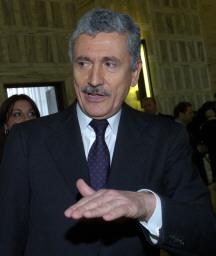The Italian cabinet will meet Thursday to greenlight Italy's widely expected recognition of Kosovo, Foreign Minister Massimo D'Alema said on Wednesday.
The caretaker diplomatic chief said it was ''understandable'' that Serbia should be ''bitter'' about the loss of its province eight years after the West stepped in to stop Serbian attacks on the 90% ethnically Albanian Kosovars.
But he noted: ''From a substantive viewpoint, Kosovo has no longer been part of Serbia for eight years''.
''What we are seeing is not a separation. Separation had already occurred. We are seeing the inevitable culmination of a process that is the fruit of historical events which, unfortunately, none of us can change''.
D'Alema said he expected Serbia's ambassador to Italy to be called back to Belgrade when Italy recognises Kosovo - a fact that Serbian Foreign Minister Vuk Jeremic immediately confirmed.
Serbia, which hopes to move closer to the European Union, has recalled its ambassadors to Washington, Paris and some other countries in protest at recognition by the United States and EU powers.
But Serbia insisted it would not cut ties.
D'Alema voiced confidence that any rifts over recognition could be overcome.
''I trust we can return to the path of dialogue, particularly between Pristina and Belgrade...We must look to the future''.
He said it was the EU's task to promote this dialogue.
D'Alema announced Monday that Italy would recognise Kosovo after a meeting of EU foreign ministers which decided that it was better for member states to recognise Kosovo individually rather than for the EU to do so as a bloc.
He added that he expected the majority of EU members to recognise Kosovo within a month's time.
Kosovo unilaterally declared its independence on Sunday.
The move had the backing of the major Western powers which believed it was impossible to restore Serb rule in the province after nine years under United Nations administration.
Serbia, backed by Russia, has fiercely opposed the independence of its medieval heartland, an area that arouses patriotic sentiment in many Serbs.
Italy, which was part of the EU's contact group on Kosovo, is a lead player in a new EU mission in Kosovo aimed at maintaining civil law and order there.
The mission replaces a similar one which has been run by the UN over the past nine years.
On Wednesday Russia said the EU mission was in breach of international law.
Germany and Norway became the latest countries to recognise Kosovo on Wednesday.













